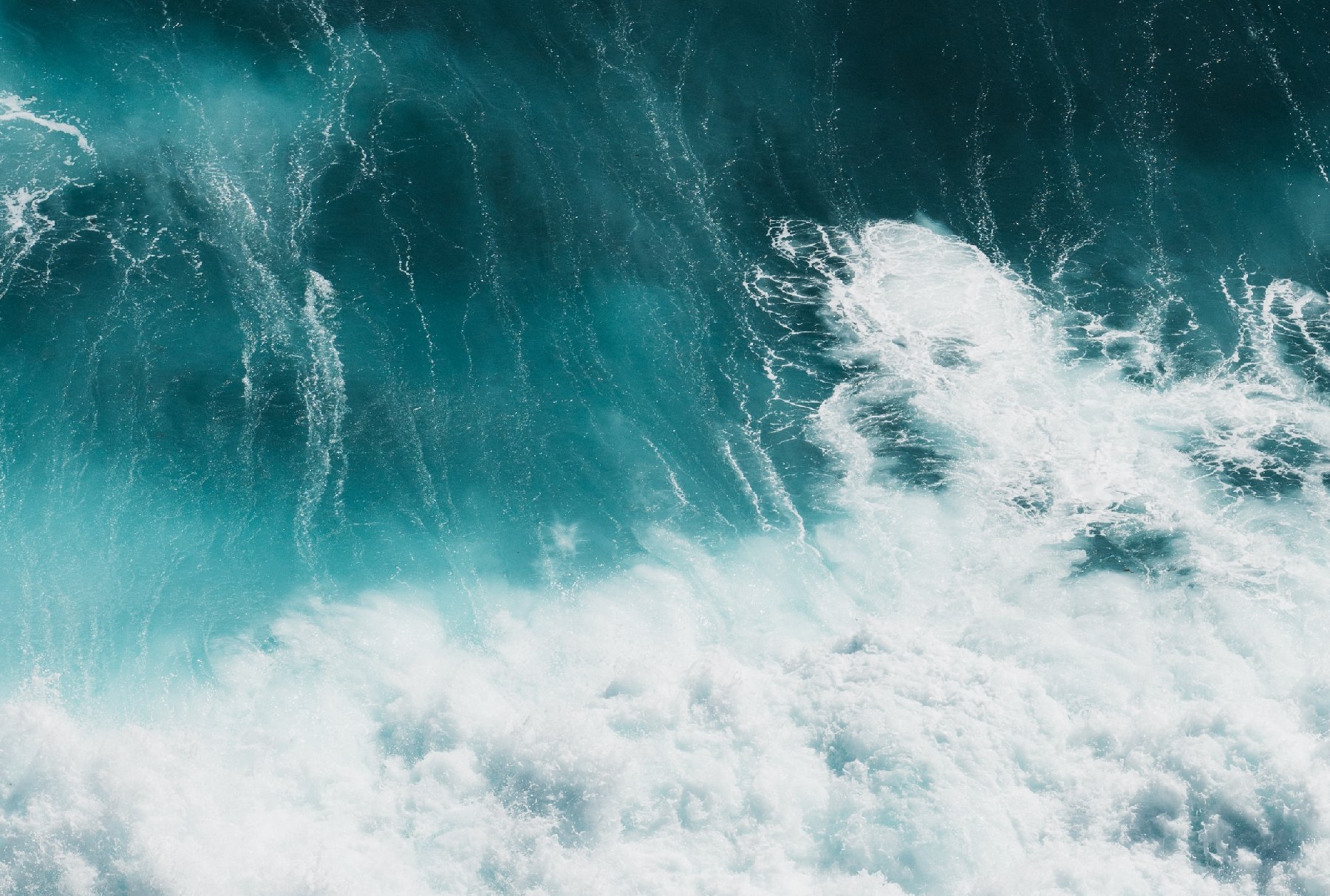Our Postgraduate Researchers
Cameron Trotter, PhD
Supervisors: Prof. Per Berggren, Prof. Nick Wright, Dr Stephen McGough
Project title: Towards automatic photo-identification of Cetaceans: A fine-grained, few-shot problem in marine ecology.
I focus on the application of computer vision to marine ecology, developing a framework for automatic individual-level cetacean identification utilising a pipeline of computer vision models and post-processing techniques. The developed system is capable of fine-grained, few-shot classification, generating top-n lists of most likely catalogue matches as well as being capable of detecting potentially previously uncatalogued individuals. This framework has been shown to be invariant to changes in species of interest, geography, and time.
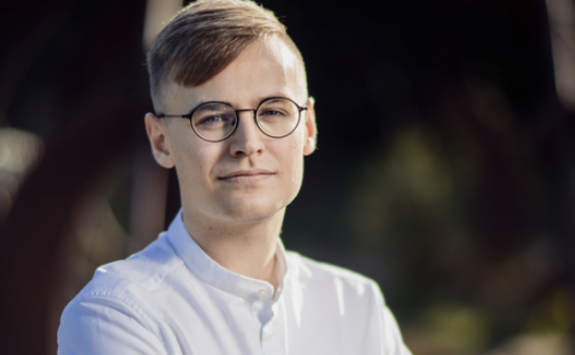
My research has resulted in the release of multiple publications at conferences and workshops in the space of both marine ecology and computer vision, including CVPR, IEEE Big Data, and SMM.
Contact information
Email: c.trotter2@ncl.ac.uk
Twitter: @CamTrotts
LinkedIn: www.linkedin.com/in/cameron-trotter/
Eveline van der Steeg, PhD
Supervisors: Dr James Guest, Dr Adriana Humanes and Dr Margaret Miller
Project title: Optimizing reef restoration through sexual coral propagation.
Worldwide coral reef decline has led to the development of active coral reef restoration initiatives. Our research group, the Coralassist Lab, studies the feasibility of selectively breeding corals with higher tolerance to increased ocean temperatures, aiming to produce corals which can survive bleaching events. However, high mortality rates and costs prevent the implementation of sexual coral propagation techniques for coral reef restoration efforts at meaningful ecological scales.
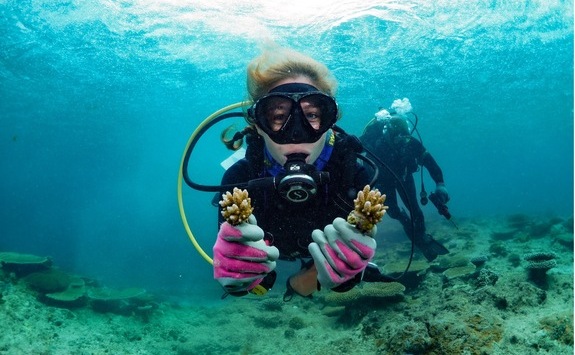
For my PhD, I study ways to optimize the survivorship, growth and cost-effectiveness of different coral rearing and outplant techniques in the Republic of Palau. I explore different shapes of settlement units, various outplant ages and sizes, and differing levels of grazer deterrents. With the results, I aim to increase our understanding on the enhancement of early survivorship of sexually propagated corals in ex-situ and in-situ nurseries and increase outplant yield and efficiency.
Contact information
Email: evelinevdsteeg@gmail.com
Twitter: @EvelinevdSteeg
LinkedIn: www.linkedin.com/in/evelinevandersteeg/
Research page: www.coralassistlab.org/eveline-van-der-steeg
Hannah Scarlett Earp, PhD
Supervisors: Prof. Pippa Moore, Prof. Paul Shaw, Dr Dan Smale, Dr Alejandro Pérez-Matus
Project title: The structure, resilience and restoration of kelp forests and their associated understorey assemblages.
Kelp are ecosystem engineers that form forests along one quarter of the world’s temperate rocky coastlines. The three-dimensional structure of the forest modifies local environmental conditions, allowing understorey assemblages to develop. However, information on the structure and functioning of these understorey assemblages is limited. The first aim of my research is to understand spatial and seasonal variation, and the resilience to storm disturbance, of understorey macrofloral and macrofaunal assemblages within Laminaria hyperborea forests in the UK.
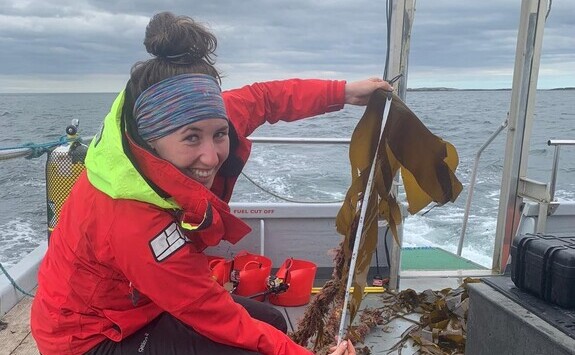
Given that kelp forests are declining in many regions, interest in restoration as a tool to mitigate declines and reinstate kelp forests is increasing. The second aim of my research is to further our understanding of kelp forest restoration by conducting a meta-analysis of global kelp forest restoration efforts to date, and to test the efficacy of the ‘green gravel’ kelp restoration technique on exposed coasts in north-east England.
Contact information
Twitter: @hannahsearp
Email: hse3@aber.ac.uk / hannah.earp@newcastle.ac.uk
Matt Sharpe, PhD
Supervisors: Prof. Per Berggren and Prof. Nick Wright
Project title: Advancing the application of passive acoustic monitoring for investigating odontocete ecology.
Effective conservation requires data on species occurrence, abundance, and area usage. Providing this information is difficult for odontocetes (i.e., toothed whales) due to the challenges of collecting data at sea. Passive Acoustic Monitoring (PAM; the method of detecting animals remotely using hydrophones) has proven a viable approach to studying odontocetes as all species produce sounds such as echolocation clicks.
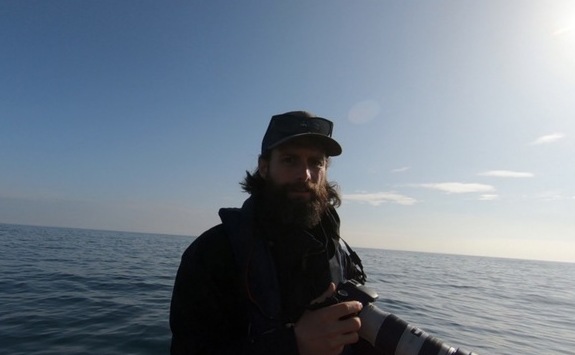
My work is focused on using PAM to investigate odontocetes off the Northumberland coast to inform conservation. To achieve this, I have developed methodological approaches that provide deeper insights into their ecology. This includes separating local species (harbour porpoise, bottlenose dolphin and white-beaked dolphin) based on acoustic properties of their echolocation clicks; identifying behavioural states from vocalisations of bottlenose dolphins; and estimating dolphin abundance from individually specific whistles, termed signature whistles. Work is currently underway to provide these research outputs to Natural England to inform policy.
Contact information
Email: m.j.sharpe@newacstle.ac.uk
Twitter: @MSharpe_
LinkedIn: www.linkedin.com/in/matt-sharpe-96793865/
ResearchGate: www.researchgate.net/profile/Matt-Sharpe
Maxine Canvin, PhD
Supervisors: Prof. Pippa Moore, Dr Will Reid, Dr Dan Smale, Dr Nathan King
Project title: Quantifying the contribution of kelp farming to Blue Carbon ecosystem services.
Seaweed farming is a global, rapidly expanding industry. It has been recently suggested that the transfer of organic matter from seaweed farms to the surrounding environment is significant, and that a fraction of this seaweed-derived carbon may be retained in long-term carbon sinks (e.g. deep water, shelf sediments, coastal vegetated habitats), thereby contributing to natural carbon sequestration (i.e. Blue Carbon). However, the evidence base for this is currently weak and derived from a handful of empirical studies.
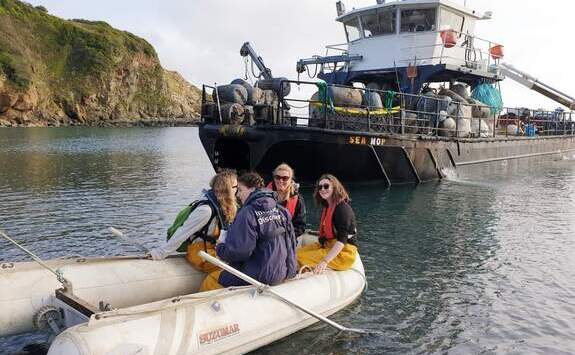
This project aims to quantify the Blue Carbon potential of UK kelp farms by measuring the release of dissolved and particulate organic carbon, how much kelp-derived carbon is stored in sediment in and around kelp farms, and determining the transport of kelp-derived carbon out of farms.
Contact information
Email:m.c.canvin2@newcastle.ac.uk
Twitter: @MaxineCanvin
Ni Wayan Purnama Sari, PhD
Supervisors: Dr James Guest
Project title: Indonesia’s Ornamental Coral: Advancing, techniques, development, and adaptation to climate change.
The trade for live coral for commercial and personal aquarium purposes has increased in the last two decades in response to increasing consumer demand for aquarium ornamental corals and advances in coral cultivation techniques. Indonesia became the largest live coral exporter and in early 2000 as supplied 70-80% of the global live coral trade. This includes the ten key species: Acropora spp., Montipora spp., Goniopora spp., Trachyphllia geoffroyi, Heliofungia actiniformis, Plerogyra sinuosa, Euphyllia cristata, Fungia spp., Caulastrea spp. and Euphyllia ancora. Some of these species have succeeded in mariculture but some are dependent on harvesting directly from the wild. Continuous uptake from the wild might cause coral to be threatened with extinction, especially when the species are rare with limited distribution area. Therefore, my study will focus on these species' potential stock and biology.
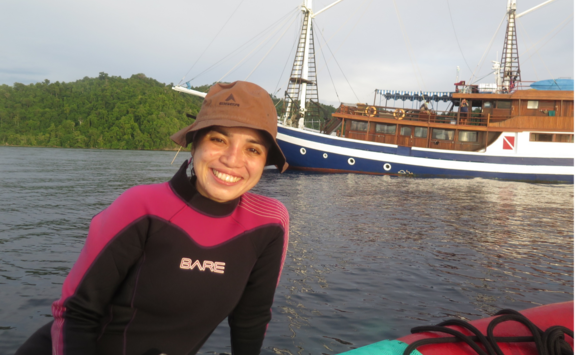
This study primarily aims to develop advanced techniques of coral mariculture to enable rare species to breed in mariculture and to gain maximum yield and high-value products. This will provide solutions regarding ornamental coral mariculture advanced techniques and regulation-making to balance their utilization and sustainability.
Contact information
Email:n.w.p.sari2@newcastle.ac.uk
Twitter: @NwpSariayu
LinkedIn: www.linkedin.com/in/ni-wayan-purnama-sari-413595a3/
ResearchGate: www.researchgate.net/profile/Ni-Wayan-Sari
Peter Almond, PhD and RA
Supervisors: Prof. Clare Fitzsimmons and Dr. William Reid
Project title: A resilient ecological network of shipwreck-associated communities in the North Sea.
Shipwrecks, as artificial structures, form unique benthic habitats, providing hard, complex substrate to communities unable to settle in an otherwise soft sediment-dominated habitat. This is particularly true in a North Sea context, where manmade structures provide the only refugia in an area subjected to centuries of disease and overfishing. My research focuses on investigating to what extent shipwrecks in the North Sea form a resilient ecological network for marine communities, promoting connectivity and resilience in the face of environmental and anthropogenic pressures.
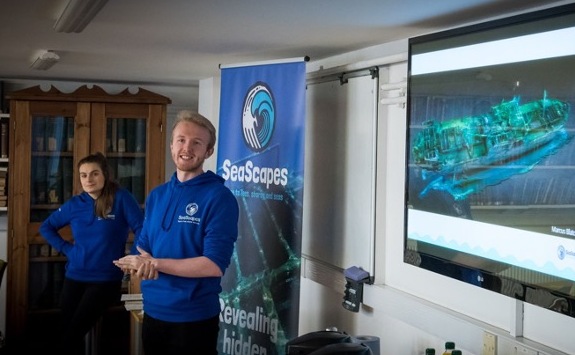
As well as completing my PhD, I am also working as a Research Assistant for the Seascapes Heritage Partnership, with a focus on delivering the Beneath the Waves project. Through the use of three-dimensional photogrammetry techniques, we are working with local North-East dive clubs to capture the hidden heritage along our coastline, capturing 3D models of historically important shipwrecks to showcase to local communities.
Contact information
Email: p.almond@newcastle.ac.uk
Twitter: @petermalmond
LinkedIn: www.linkedin.com/in/peter-almond-0a045119b/
Research group: https://exploreseascapes.co.uk/beneath-the-waves/
Rubén de la Torre Cerro, PhD
Supervisors: Dr James Guest, Dr Aileen Mill, Dr Holly East, Dr Jamie Craggs
Project title: Unravelling the drivers of coral reproductive phenology and synchrony.
Coral reefs are declining worldwide due to ocean warming and other global change drivers. Although many initiatives currently aim to withstand the damage of marine heat waves, such as coral bleaching and mortality in adult stages, the effect of global change in coral spawning phenology and synchrony can also have a major impact on the persistence of coral reefs.
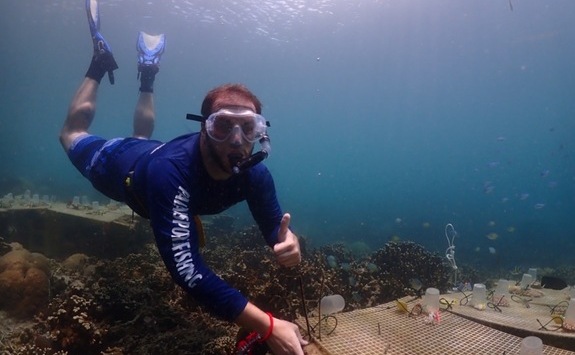
I am carrying out my PhD in the Coralassist Lab, studying the environmental cues of coral spawning timing and synchrony. In particular, I am investigating the role of moonlight, darkness after sunset, artificial light and SST in the spawning timing of different coral families. Combining knowledge of gametogenic cycles and the response of coral families to these drivers, I aim to elaborate better predictions of coral spawning timing and to identify possible breakdowns in spawning synchrony. My results aim to increase our understanding on coral phenology and have the potential to maximise conservation and restoration efforts.
Contact information
Email: rubendltcerro@gmail.com
Twitter: @rbn7c
LinkedIn: www.linkedin.com/in/rubén-de-la-torre-cerro-0804a1108/
Research page: www.coralassistlab.org/rubendelatorrecerro
Sol Lucas, PhD
Supervisors: Prof. Per Berggren, Dr Isabel Smallegange
Project title: Bycatch reduction and resilience of elasmobranch populations in response to fishing pressure and environmental change.
Marine megafauna are vital for ecosystem and fishery health. My research aims to identify threats, status and bycatch reduction techniques to promote the conservation of marine megafauna, with a focus on elasmobranchs (sharks and rays).
I investigate the use of sensory deterrents to reduce bycatch of marine megafauna. This involves filming the behavioural responses of blue sharks (Prionace glauca) to ferrite magnets, using pelagic baited remote underwater video systems (BRUVS).
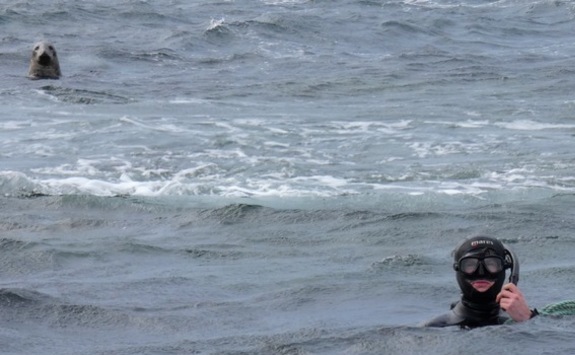
I am interested in how elasmobranchs respond to ecological change. We are conducting analyses on 35 shark and ray species to predict population responses to environmental variability using dynamic energy budget models. These models require basic life-history information, which is an advantage for often poorly-studied species.
Contact information
Twitter: @SolLucas10
Email:s.a.lucas2@newcastle.ac.uk
LinkedIn: www.linkedin.com/in/sol-lucas-a58542b7/
